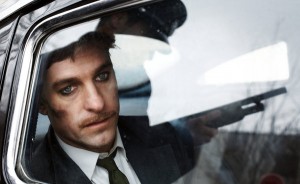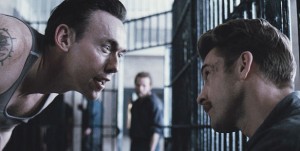EDWIN BOYD: CITIZEN GANGSTER: 3 STARS
 “Edwin Boyd: Citizen Gangster” is so steeped in Canadiana even Lorne Greene makes an appearance. Viewers of a certain age will remember Greene as the Voice of Doom during World War II CBC broadcasts, and Torontonians might remember his acting school on Jarvis Street. Both aspects of Greene’s career are represented in this crime drama, and they are just two of the details that help this period piece establish a convincing sense of time and place.
“Edwin Boyd: Citizen Gangster” is so steeped in Canadiana even Lorne Greene makes an appearance. Viewers of a certain age will remember Greene as the Voice of Doom during World War II CBC broadcasts, and Torontonians might remember his acting school on Jarvis Street. Both aspects of Greene’s career are represented in this crime drama, and they are just two of the details that help this period piece establish a convincing sense of time and place.
Scott Speedman plays Edwin Boyd, a disillusioned World War II veteran and legendary bank robber who, along with his gang—the muscle bound Lenny (Kevin Durand), and Val (Joseph Cross) and Willie the Clown (Brendan Fletcher)—became the Canadian equivalent of Public Enemy Number One after pulling off a series of brazen bank robberies and daring jail breaks.
“Edwin Boyd: Citizen Gangster” does a good job of showing how Boyd went from respectable veteran/bus driver/son of a cop to a fixture on the most wanted charts. It’s not the romp “Public Enemy” was, instead it’s a contemplative movie more about why Boyd robbed banks than the robberies themselves.
It nicely details how the combat fatigue and disappointment Boyd felt after coming home from war was alleviated by the adrenaline rush of robbing banks and how his need for acknowledgement—this is a man who wanted to be a Hollywood star—was fanned by newspaper reports of a “dashing” robber. He enjoyed his notoriety, as shown in one nicely written scene in the back of a police car.
“You’ve made my wife a happy woman,” says the arresting detective.
“Is she a fan?” Boyd replies.
“No, I’ll get home early for a change.”
Director and writer Nathan Morlando effectively paints a picture of Boyd as more a desperate man than folk hero and Speedman does good work exploring the troubled soul of a man forced by ego and circumstance into becoming a criminal.
“Edwin Boyd: Citizen Gangster” also does a nice job of recreating mid-century Toronto—complete with footage of Lorne Greene!—although modern telephone light poles are, apparently, the bane of low budget period pictures.
As a character study “Edwin Boyd: Citizen Gangster” succeeds—painting a vivid picture of desperation and determination-despite a few overwrought moments and a droopy midsection.

